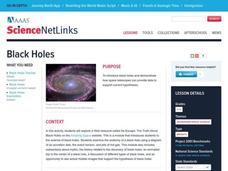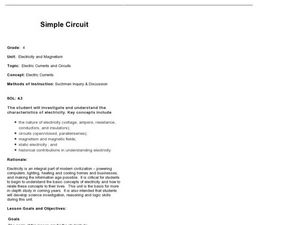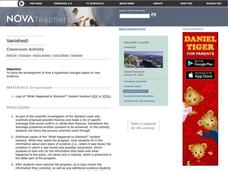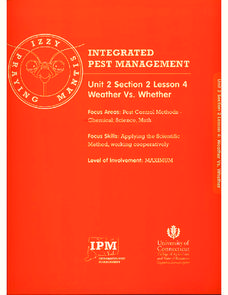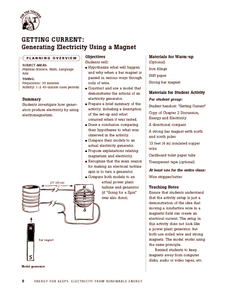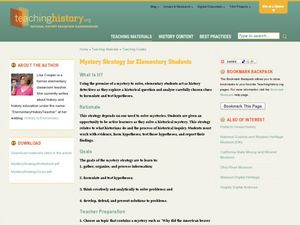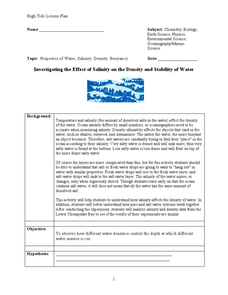Curated OER
Black Holes
Students study black holes and see how space telescopes can provide data to support current hypotheses. They examine the anatomy of a black hole using a diagram of an accretion disk, the event horizon, and jets of hot gas.
Curated OER
Deformed Frogs! - The Parasite Hypothesis
This project provides learners the opportunity to investigate parasites as a possible cause of the observed frog deformities. It asks students to view web-based evidence and interpret whether it supports the parasite hypothesis. Learners...
Curated OER
Simple Circuit: Electric Currents and Circuits
Through inquiry and exploration, 4th graders will learn and understand the functions of open and closed circuits. They will break into 2 groups, define vocabulary, hypothesize how to light a bulb, then test their hypothesis 4 different...
Discovery Education
Motion in the Ocean
How do temperature changes affect ocean currents? Scholars explore convection currents by demonstrating the flow of water in a baking dish. They use ice, heat, and food coloring to see currents. Then, they draw conclusions about their...
Curated OER
Predicting: Making a Hypothesis
Students analyze information from various sources to create a hypothesis about the origin of a family artifact. Students create a hypothesis about the origin of the item and write a paragraph explaining why they believe the hypothesis is...
Curated OER
An Introduction to Microbes and Microbes Are Everywhere
Seventh graders define the term microbe. They identify the five main groups of microbes. Students give examples of ways in which microbes have impacted or currently impact human life. They create a hypotheses for where they expect to...
Curated OER
Vanished!
Students view a video clip about the Stardust crash site. They discover how hypothesis change based on new evidence. They research unsolved plane crashes as well.
Rochester Institute of Technology
Electrical Energy
My friend told me how electricity is measured and I was like Watt! In the hands-on activity, learners explore electricity by building circuits, both parallel and series. They also determine how increasing the number of light bulbs and...
Curated OER
Testing the Hypothesis
Young scholars create and conduct various experiments to determine the origin of a family artifact, and then determine whether their results were successful. Students summarize their results and evaluate whether their hypotheses were...
It's About Time
Oil and Gas Production
Would you consider a power failure a current event? This lesson uses multiple experiments, guided inquiry activities, and group discussions to cover the topics of oil and gas production. This is the seventh lesson in a series of eight.
Bonneville
A Simple Circuit
Heat up a lesson on solar energy by building a circuit for a cooling fan. Given a solar module and a DC motor, scholars develop hypotheses for how to make the fan turn. They test out their hypotheses, and then draw a circuit diagram to...
University of Connecticut
Weather Vs. Whether
Monarch butterfly populations have decreased by 90 percent over the past 20 years due to misuse and ineffectiveness of some pesticides. Given the challenge to increase pesticide safety and effectiveness, the class, through discussion,...
Energy for Keeps
Getting Current: Generating Electricity Using a Magnet
Give your class a magnetic charge with this creative experiment designed to teach emerging scientists about electromagnetism. Pupils construct a model that demonstrates the function of an electrical generator and test this creation in a...
Curated OER
What Color is Chlorophyll?
Students observe the interactions of chlorophyll and light. They develop and form their own testable hypotheses. Students predict the color of chlorophyll in various types of plants.
Curated OER
Testing Battery Combinations
Fourth graders examine the required combinations of plates and predict which combination will generate the most and least current and voltage. They use an ammeter and experiment with combinations of their own testing and record each...
Curated OER
Galvanic Reactions
Students create a battery using pennies. In this galvanic reactions lesson plan, students use pennies, a washer, salt water, wires, tape and a paper towel to create a battery. They use a voltmeter to record the voltage in their battery...
Curated OER
Mystery Strategy for Elementary Students
Learners of all ages solve historical mysteries. Elementary learners research historical topics by organizing information presented by their instructor, formulating hypotheses, and considering solutions to mysteries presented about...
Energy for Keeps
Renewable Energy Action Project: What's in Your Energy Portfolio?
Uncover the renewable energy potential in your region. The activity outlines an approach to research current practices and trends. Learners conduct surveys to assess the attitudes of the local population and prepare a paper summarizing...
Serendip
Where Does a Plant's Mass Come From?
Where does the mass for a growing tree come from? Scholars consider a few different hypotheses and guess which is correct. They then analyze data from different experiments to understand which concepts science supports.
Curated OER
Creating Civic Awareness Through Artistic and Literary Forms
Interpret current events using editorial cartoons and other print media. Middle schoolers explore the meanings of literary and artistic terms such as satire, irony, and caricature. They visit internet sites to develop an understanding of...
Curated OER
Investigating the Effect of Salinity on the Density and Stability of Water
Water with varying amounts of dissolved salt are dyed and then used to compare densities. The objective is to discover the effect of salinity, and therefore density, on ocean water on the stability of the ocean. Many branches of science...
American Chemical Society
The Energy of Evaporation
Do all liquids evaporate at the same rate? Young scientists observe the evaporation rate of three different liquids. They measure the time, the temperature, and the change in energy. After comparing the chemical formulas, scholars...
Curated OER
Investigating the Biosphere With Planetary Models
Learners create a biosphere using the computer program SImEarth. They work in small groups to create "Daisyworld" in which they model aspects of the Gaia hypothesis. They form a question to answer and choose variables to investigate in...
Curated OER
Geography 12
Geography is such a fascinating subject for learners of all ages. Prepare learners with good guiding questions, which they can use while reading their texts. Each of the provided 13 questions requires a full paragraph response on the...


